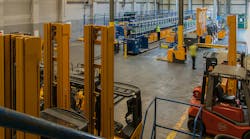This month's Warehousing & Distribution section focuses on storage. We present case studies of two companies - one that paid special attention to its storage needs when building a new distribution center (DC), and another which increased its storage capacity and improved ergonomic conditions for its employees at the same time. And on page 60, we highlight some of the newest storage products.
Last month, I wrote about the problem of counterfeit prescription drugs slipping through the pharmaceutical distribution system. Another growing situation is consolidation, or large pharmaceutical companies buying smaller companies. This problem isn't limited to pharmaceutical companies - it happens in most industries, and it has ramifications for DC storage.
Both are issues that affect you professionally and personally. As for counterfeit drugs, the Food and Drug Administration (FDA) and the Healthcare Distribution Management Association (HDMA) are trying to plug the holes in the drug distribution system. Technology will play a large role in this scenario. According to the FDA proposals, to combat the problem, drug wholesalers would have to possess "technology and equipment that allows the wholesale distributor to authenticate, track and trace drugs and devices."
The HDMA is pursuing the use of technology that's become a buzzword in material handling: RFID. The association has issued a position statement acknowledging the capabilities of the electronic product code (EPC) and RFID to track drugs, and RFID's potential to "streamline distribution processes, revolutionize inventory management...and automate inventory rotation, resulting in a more efficient distribution system."
Toward that end, the HDMA supports an initiative, in cooperation with all members of the health care distribution supply chain, for manufacturers and wholesalers to use EPC tags at the case level by December 2005 and at the selling unit level by 2007 - echoes of Wal-Mart's "RFID by 2005" mandate.
Material handling companies are also stepping into the picture. HK Systems recently opened a Pharmaceutical Center of Excellence (COE) to help pharmaceutical companies in manufacturing, warehousing and distribution environments. According to Jim Borecki, vice president of the HK Systems COE, on the distribution side, the COE will focus on development of order fulfillment type solutions for DC operations.
In explaining the company's plans, Borecki also touched on how the recent wave of consolidation affects storage. One result is that with fewer pharmaceutical companies, DC operations become that much more complicated.
"A lot of the problems that we (the COE) have focused on have been driven by the acquisition of companies within the pharmaceutical space," says Borecki. "When company A buys company B, it buys not only the ethical and over-the-counter drugs and brands and assets, it buys its distribution channel. The purchasing company tries to rationalize that and tries to take money out of the supply chain by lowering the amount of DC assets it has. So facilities have to absorb more SKUs."
Space and storage become priorities, according to Borecki. "If I'm going to absorb product from Company X, I'm going to have fewer locations - whether it's pallet or bin or tote or high-rise - to store my current SKUs. So now I have to rationalize my existing facility to absorb more SKUs, and I have fewer locations to store and manage more discreet product. That's a common issue, whether it's pharmaceutical or food and beverage or anything. So you have some specific industry issues, and you have some commonality with other industries.
"Usually what that means is that companies have to make a capital investment. They're going to add rack if they're all conventional, or they're going to make the location denser, or they have to really go back and rationalize their supply chain and their product flow by better aligning the manufacturing product with the order fulfillment cycles."
In other words, when companies "consolidate," they end up spending money just to accommodate the new company and its storage needs. As more industries consolidate, manufacturers of storage equipment and systems may be some of the biggest beneficiaries.


